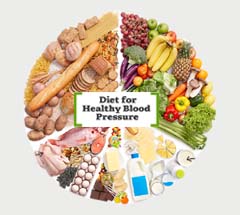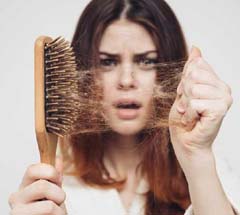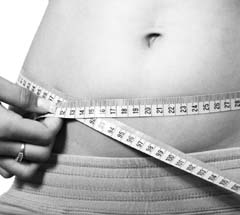Hair loss in women: common causes
 Although hair loss is a problem most often associated with men, women are nearly as likely to lose or have thinning hair. While the majority of the women notice it in their 50s or 60s, it can happen at any age and for a variety of reasons.
Although hair loss is a problem most often associated with men, women are nearly as likely to lose or have thinning hair. While the majority of the women notice it in their 50s or 60s, it can happen at any age and for a variety of reasons.
Most people lose anywhere from 50 to 100 strands of hair each day, and almost 250 strands on the days hair are washed. While this is not usually a cause of worry, there are ways to know when hair is thinning or being lost at a higher rate. Telltale signs include usually a large number of hair strands on the pillow, more than a normal amount of hair left on the comb after brushing, and too much hair on the drain strainer after hair wash.
1. Heredity
Often the answer to hair loss is hidden in your genes. If your mother, aunts, or grandmothers faced similar or greater amounts of hair loss, it is highly likely it is a hereditary issue and thus you are genetically predisposed to hair thinning and fall.
2. Hormonal Imbalance
Effects of hormonal imbalance are sadly not limited to adult acne, mood swings, and weight gain, but they often affect our hair growth cycle as well. In simple terms, women are BLESSED with female hormones (obviously!!!) that are ‘hair-friendly’ (bless our stars!) and help to keep hair in their growth phase for the optimal length of time. However, certain medical conditions such as PCOS and PCOD result in hormonal imbalance that leads to the development of more male hormones, which are not very hair friendly and can shorten the hair growth cycle.
3. Medical Condition
Other than PCOS and thyroid disorders other medical conditions have a direct impact on the hair growth lifecycle. Physical trauma, surgery, an accident, severe illness such as dengue can shock the hair cycle and push more hair into the shedding phase. Hair loss can occur a couple of weeks to six months after any of these experiences. While the condition can be severe, the good news is the majority of the time the impact is reversible.
4. Deficiency
As our mothers and grandmothers often point out, our nutrition intake (or the lack of it) has a direct impact on our hair. Women with iron and vitamin B12 deficiency often face hair loss issues. Iron is essential for producing hair cell protein, while Vitamin B12 affects the health of red blood cells, which carry oxygen to tissues. So next time you skip a meal in favor of dieting or choose junk over your greens, think again.
5. Self Inflicted
Dyes, chemical treatments, bad brushes, blow dryers, and flat irons, in short, all things women do to manipulate their hair can affect their hair badly. Bad choice of a hairstyle (too tight braids), too much brushing, brushing harshly, and aggressive towel drying also lead to hair fall.
6. Dramatic Weight Loss
While weight loss is a normal course is usually a welcome change, a steep drop in weight (intentional or unintentional) can lead to hair loss.
Thankfully the majority of these issues are avoidable and other medical help can be sought. Concentrate on eating healthy and maintaining a healthy lifestyle. Maintain your protein intake, enjoy (at least bear) your greens and stay calm as the hair grows back or the loss can be reversed with medical treatments. And in case something is wrong see a dermatologist, because the sooner treatment is started, the better the chances are for improving your growing season.


 Refer and Earn
Refer and Earn



